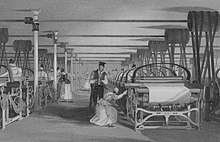World History/The Industrial Revolution
Causes of Industrial Revolution
[edit | edit source]- 1. Agricultural Revolution; people at the time before this major event relied on crops and plantations to make food, shelter, and clothing.
- 2. Labor Supply
- 3. Markets
- 4. Entrepreneurs
- 5. Transportation; Just take a moment to briefly think about how hard and complicated the process of transportation was before the 1800s for example.
- 6. Investment Capital
- 7. Inventions; Both scientific and technological inventions improved the quality of life very much.
- 8. Natural Resources
- 9. Stable Political Climate
- 10. Religious Attitudes (Protestant/Christian ethic)
- 11. Need for growth; Nothing is permanent, and there always need to be a change, in each political and individual level.
Negative aspects of the Industrial Revolution
[edit | edit source]- Low wages
- Long hours
- Unsafe conditions
- Child Labor
- Exploitation of women
- Insecure employment
- Slums
- Pollution
Responses to industrialism
[edit | edit source]- Socialism
- Unions
- Parliamentary system
Objectives
[edit | edit source]10.3 Students analyze the effects of the Industrial Revolution in England, France, Germany, Japan, and the United States.
1. Analyze why England was the first country to industrialize.
2. Examine how scientific and technological changes and new forms of energy brought about massive social, economic, and cultural change (e.g., the inventions and discoveries of James Watt, Eli Whitney, Henry Bessemer, Louis Pasteur, Thomas Edison).
3. Describe the growth of population, rural to urban migration, and growth of cities associated with the Industrial Revolution.
4. Trace the evolution of work and labor, including the demise of the slave trade and the effects of immigration, mining and manufacturing, division of labor, and the union movement.
5. Understand the connections among natural resources, entrepreneurship, labor, and capital in an industrial economy.
6. Analyze the emergence of capitalism as a dominant economic pattern and the responses to it, including Utopianism, Social Democracy, Socialism, and Communism.
7. Describe the emergence of Romanticism in art and literature (e.g., the poetry of William Blake and William Wordsworth), social criticism (e.g., the novels of Charles Dickens), and the move away from Classicism in Europe.
The Industrial Revolution
[edit | edit source]
In 1750, most people in Europe lived on small farms and produced most of their needs by hand. By the middle of the 19th century, many people lived in cities and most of their needs were produced by complex machines using steam power. The Industrial Revolution began in Great Britain and spread to Belgium, France, Germany, the United States and Japan. It was a fundamental change in the way goods were produced, and altered the way people lived. The Industrial Revolution is a major turning point in world history.
Why Great Britain?
[edit | edit source]Great Britain became the focus of the Industrial Revolution for a variety of reasons: the start of the Agrarian Revolution, an abundance of natural resources, available capital, and the political will to support innovation.
The Agrarian Revolution was a change in farming methods that allowed for a greater production of food. This revolution was fueled by the use of new farming technology such as the seed drill and improved fertilizers. The results of this revolution in farming was a population explosion due to the higher availability of food. Also, the Enclosure Movement, which was the consolidation of many small farms into one large farm, left many people jobless and homeless. These people provided the workforce of the Industrial Revolution.
Great Britain's geography provides them with an abundance of the natural resources needed for industrialization, such as iron ore and coal. Britain also had access to many navigable rivers and natural harbors which provided for the easy movement of goods both within the country, and overseas. The British overseas empire provided them with a strong economy, this produced the capital (money) needed to build railroads, factories, and mines.
Politically, British entrepreneurs enjoyed a high degree of freedom from state control, compared to their counterparts in France, Russia and other parts of Europe. A relatively fair court system existed to enforce contracts and settle disputes among capital owners. These factors may have allowed new technologies and energy resources to take root and flourish. Britain experienced a revolution in energy use as they switched from animal power, to water power, to steam power in a few short years. The steam engine was the power source of the Industrial Revolution.
Effects
[edit | edit source]Philosophy
[edit | edit source]
The philosophy of Communism appeared as a reaction to the condition of the Working Class in industrial society. Karl Marx wrote in The Communist Manifesto (1848) that all of human history is based on the conflict between the bourgeoisie (those who control the means of production) and the proletariat (working class). He predicted that the proletariat would rise up in a violent revolution to overthrow the bourgeoisie and create a society with an equal distribution of goods and services. This socialist theory would form the basis for the Bolshevik, Chinese, and Cuban Revolutions in the 20th Century. The United States had a very strong reaction to these events.
Imperialism
[edit | edit source]Due to the need for raw materials and new markets, the industrialized nations took control of Africa, India, South East Asia, and others. Imperialism had a negative effect on most of these cultures, and did not completely end until after World War II. Most of the benefits of imperialism accrued to the European nations.
The Industrial Revolution was a major turning point in world history as it resulted in a complete change in society on all levels. Effects of the Industrial Revolutions were long reaching, and influenced many other cultures both positively and negatively.